Many states allow couples to legally separate if they don’t want to get a divorce. This means the spouses live apart from one another and have separate lives.
However, they still remain married on paper. So you may be wondering whether legal separation in Florida is an option for this state’s residents.
The good news is you don’t have to search any further about it. Let’s dive into the specifics of what is a legal separation in Florida and if courts recognize them.
What Is A Legal Separation In Florida?
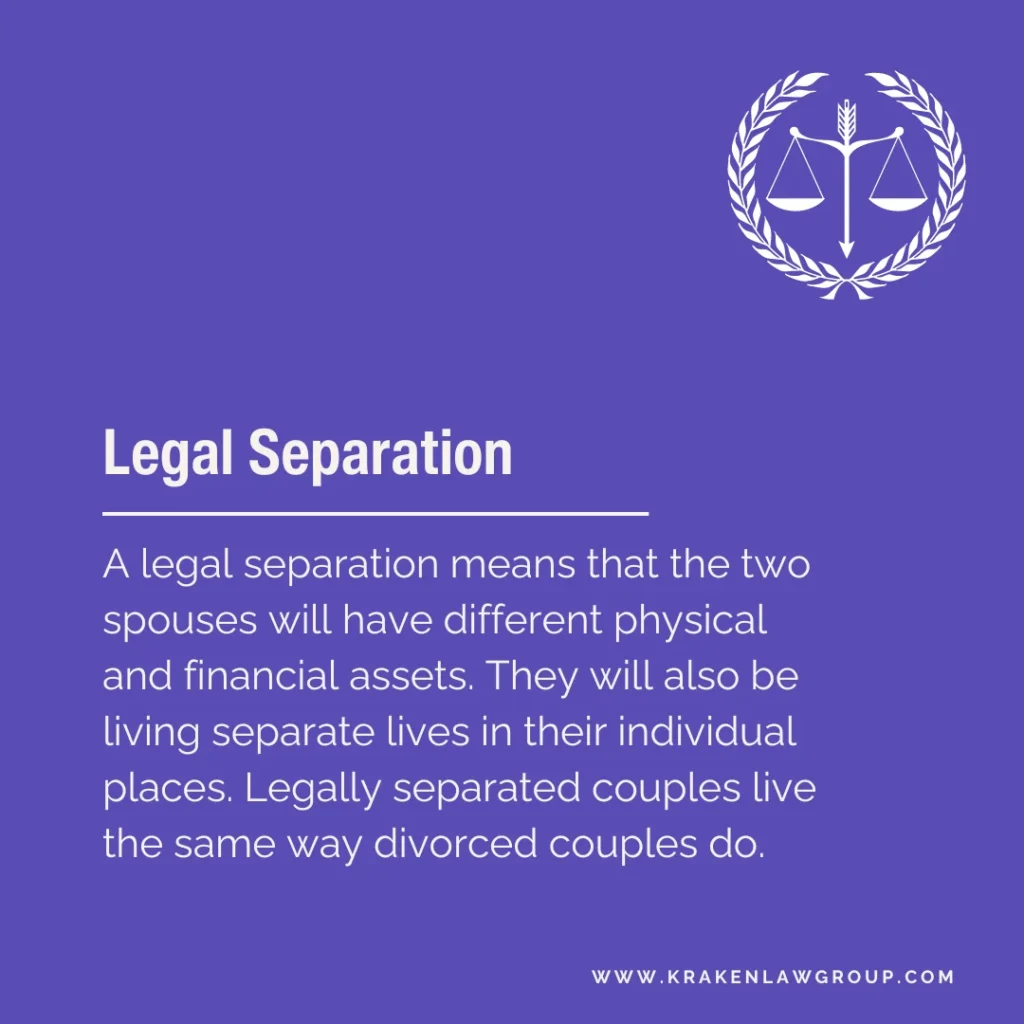
A legal separation means that the two spouses will have different physical and financial assets. They will also be living separate lives in their individual places.
The couple will also not interfere with each other’s daily lives. This means that legally separated couples live the same way divorced couples do. The key difference is that such spouses are still married in the eyes of the court.
Another thing that makes legal separation similar to divorce is that it follows the same asset division. These include:
- Property division
- Spousal support
- Debt agreements
- Child support
- Parental responsibility
A legally separated couple will have to form agreements for all these things to enjoy a smooth separation process.
Do Courts In Florida Recognize Legal Separation?
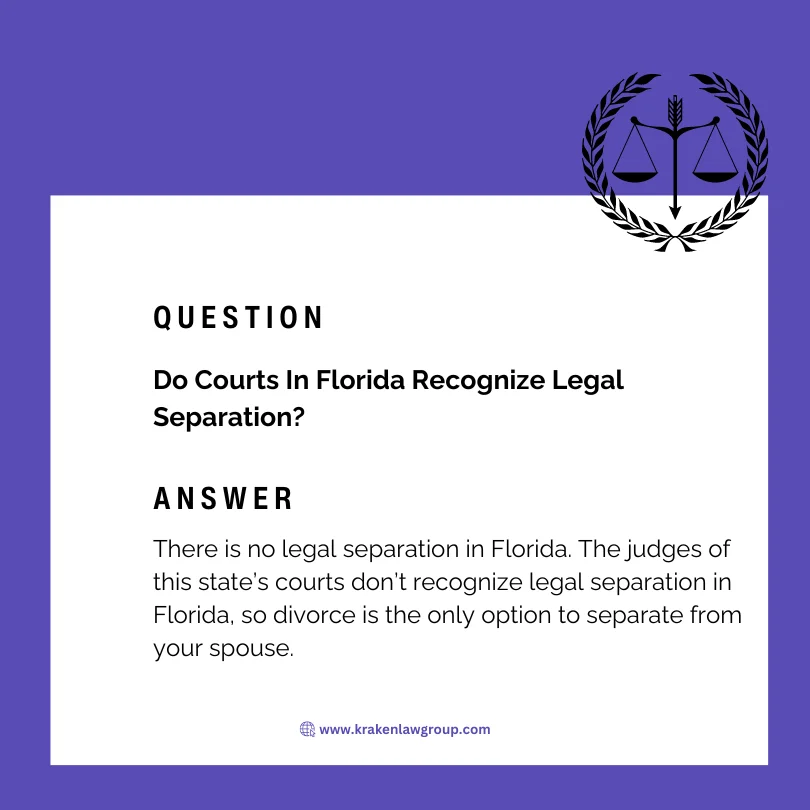
Since legal separation is recognized in different states of the US, you may think it is also allowed in Florida. However, that is not the case. There is no legal separation in Florida.
The judges of this state’s courts don’t recognize legal separation in Florida, so divorce is the only option to separate from your spouse.
Besides Florida, five other states in the US don’t allow legal separation. The good news is that this does not mean you don’t have other options besides divorce and legal separation in Florida.
You can opt for an informal separation agreement that can help you stay apart from your spouse without any consequences.
There are also court-approved alternatives that do not equate to legal separation in Florida but offer something close to it.
A consultation with a family lawyer may help you understand more about the Florida separation agreement easily.
An Informal Florida Separation Agreement Before Divorce
An informal Florida separation agreement before divorce is for those couples who want to stay apart for some time. You may not want to get divorced yet. The separation may also help you understand whether you want to work on your marriage or get divorced.
The Florida separation agreement is a legally binding document that will contain the conditions of your separation. It may also include other terms that you commonly find in documents of divorce and legal separation in Florida.
For example, you can address the following things in your informal Florida separation agreement:
- Property issues
- Debt division
- Parenting time
- Financial support issues
Once you have prepared the agreement, you can file it with a court clerk yourself or ask your lawyer to do it. The latter is a better idea because an attorney can also check your document for errors and loopholes.
A judge will review the informal Florida separation agreement and decide whether to approve it. If they approve, the document will turn into a court order.
This means you and your spouse cannot violate the terms or change them without asking the court for modification approval. There are different types of separation agreements that judges may accept.
However, only one type is accepted in Florida. It is called a postnuptial agreement and has specific requirements for it to be legally binding:
A Postnuptial Agreement Must Be In Written Form
Whenever you’re preparing an informal Florida separation agreement, you must ensure it is in written form. You and your partner may talk about everything verbally and enforce the terms and conditions. However, that can create issues later in court.
This is why you must prepare a proper document targeting all marital aspects that come under postnuptial agreements. The judge will review that document to decide about child custody.
Sometimes the court may alter some aspects of the postnuptial agreement if they find it unfair towards the kids or one spouse.
There Must Be Full Disclosure
Another legal requirement of an informal Florida separation agreement such as a postnuptial agreement is full disclosure. You and your spouse must attest that you have disclosed all assets during the preparation of the document.
You must also attest that all documents such as net income statements are accurate and according to the latest salaries. If full disclosure is achieved, you will not be allowed to enter into the agreement.
For example, the court will reject the agreement if you decide to pay them $2,000 in alimony, while they are unaware of your large retirement account.
If a violation of this term is found out later after the agreement has been approved, your spouse can object to it in court. The court will agree to this objection, which means the postnuptial document would be null and void.
Will A Separation Affect Child Custody In Florida?
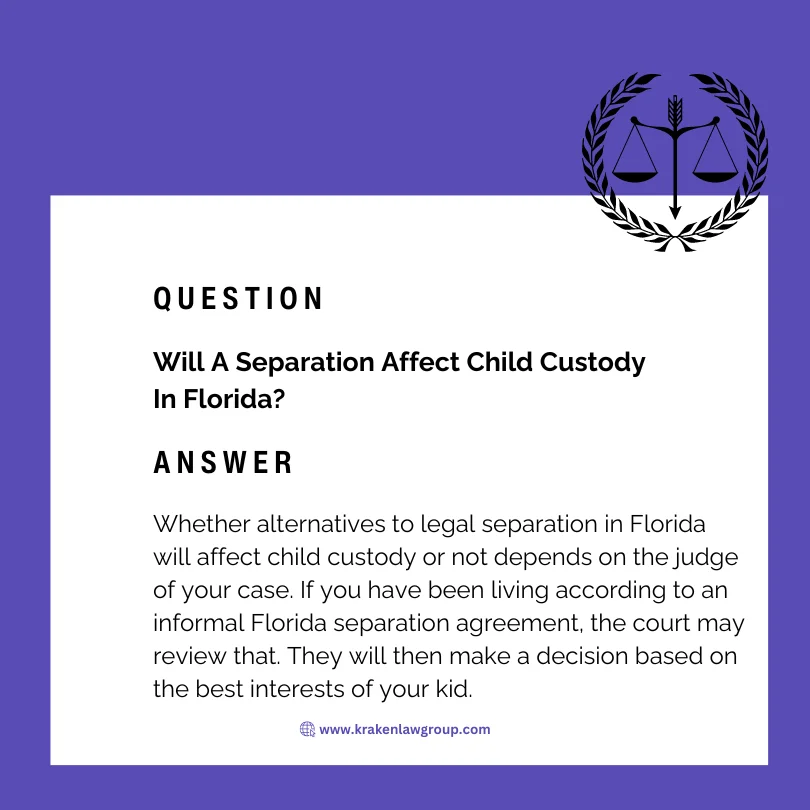
Whether alternatives to legal separation in Florida will affect child custody or not depends on the judge of your case. If you have been living according to an informal Florida separation agreement, the court may review that.
They will then make a decision based on the best interests of your kid. For example, the court will evaluate whether the current custody arrangement is beneficial to the kid or not.
A judge will also consider other factors such as the lifestyle of the kid with the relevant spouse, the net income of the parents, past contributions towards childcare, and more.
Once a judge considers all these factors they will have two options. They may allow you and your spouse to continue the child custody arrangement you have been following.
The other option is they may award one parent custody while offering visitation rights to the other. Sometimes the court may also equally award custody to both parents by assigning those different days with their child.
This means that separation does affect child custody and how it does that will depend on your original agreement. So it is advisable to prepare a custody arrangement that will be beneficial to your child’s mental and physical health.
Can A Post-Nuptial Agreement Serve As A Substitute For Legal Separation In Florida?
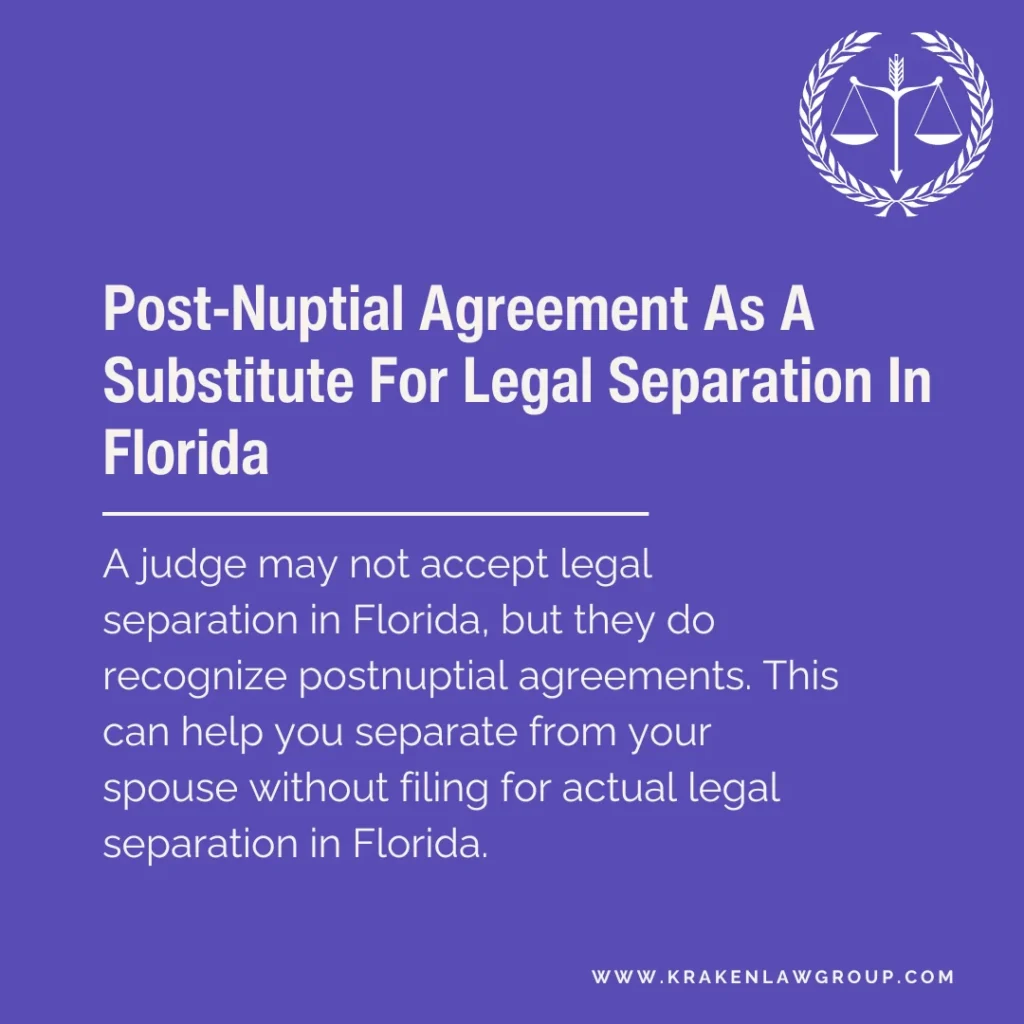
A judge may not accept legal separation in Florida, but they do recognize postnuptial agreements. This can help you separate from your spouse without filing for actual legal separation in Florida.
Most couples don’t know about postnuptial agreements because they are not as famous as prenuptial documents. The main difference between the two agreements is that the former document is enforced after a couple has entered into a marriage.
The best thing about postnuptial agreements is that they are legally binding. So every court in Florida recognizes it, unlike legal separation in Florida.
Postnuptial agreements may serve as a substitute for legal separation in Florida because they target various marital aspects discussed below:
1. Who Gets The House In Florida?
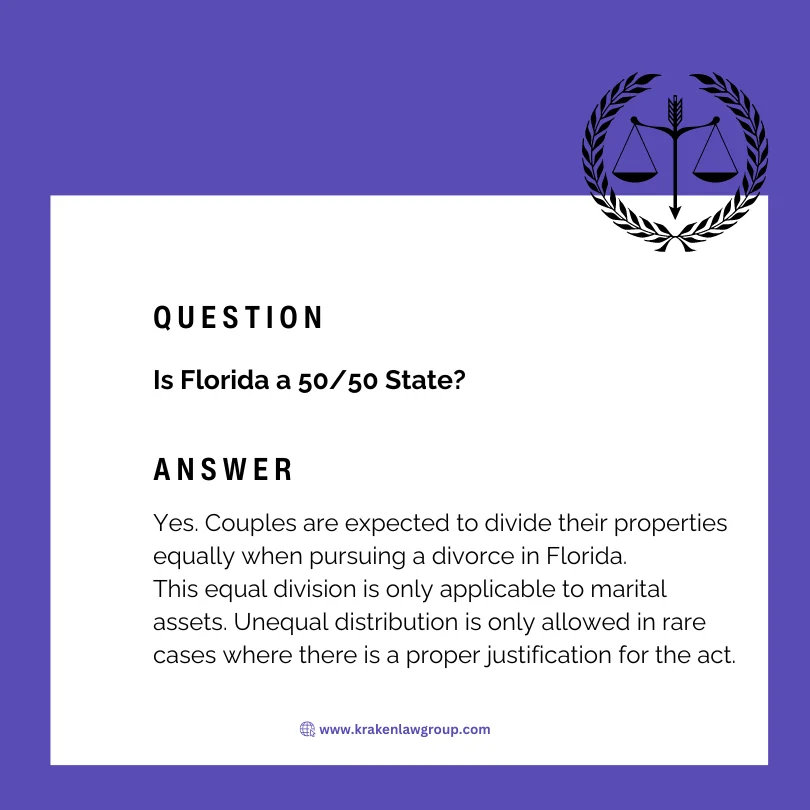
One of the top things that legal separation in Florida covers is who gets the marital house in Florida. The good news is that postnuptial agreements also target this aspect of marriages.
You and your partner can talk about who should get the marital home. If both of you want the residence, you may discuss factors that affect your justification to get the home.
For example, if you’re taking care of the child primarily, you may want the house to offer the kid stability after separation. You may also compare your net income and other assets to determine who should get the house.
Once you agree on the division of the marital home, you can move on to other aspects such as financial support as per different categories.
2. Alimony Support
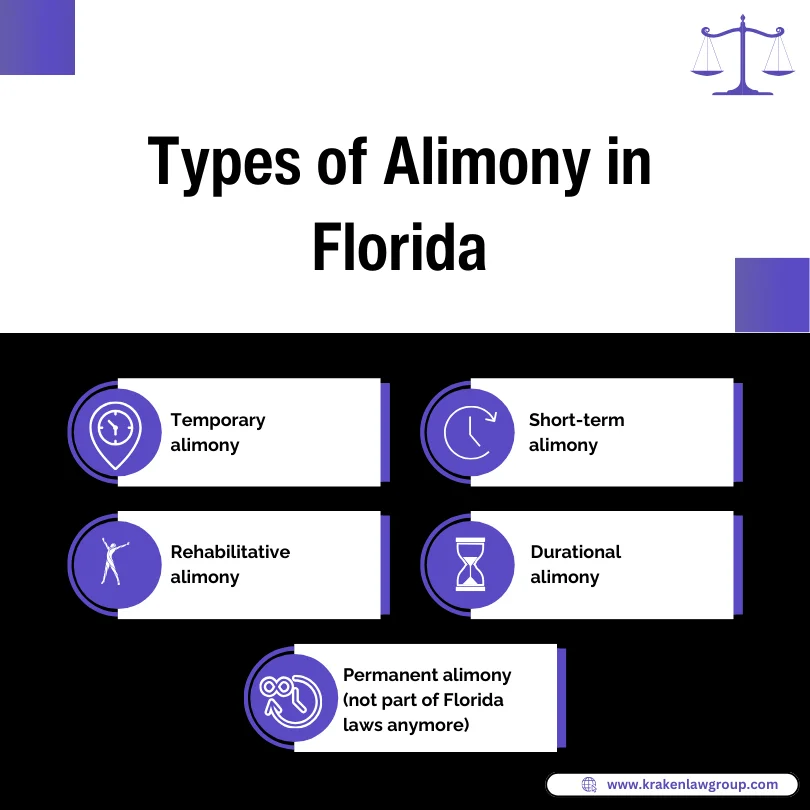
It is important to ensure you are financially stable after a divorce or legal separation in Florida. Since courts do not recognize the latter documents, postnuptial agreements target this factor too.
You and your spouse can discuss alimony support arrangements by considering each other’s finances. Both of you can follow the same procedure that most courts use to determine alimony support.
For instance, you must gather your net monthly and annual income statements. This will allow you and your spouse to determine how much income you bring home after all deductibles.
Another thing you must consider is the contribution of each spouse towards the marriage. You will also have to factor in career sacrifices due to children or home management.
These things will allow you to determine whether one spouse needs alimony support or not. It will also help you decide whether the other spouse will be able to pay the amount or not.
3. Child Support

Child support is the second category under financial support that couples must consider when pursuing separation or divorce. The first thing you should understand is the number of minor kids you have.
Remember child support is only paid for children that are dependent on you. These include:
- Minor kids
- Kids with mental or physical disabilities
- An adult child who has not graduated from school yet
You can make the process of child support easier by hiring a lawyer to help you calculate the relevant amount that has to be paid. They can also use the court formula to determine which parent must pay child support.
If you don’t want to hire a lawyer for this purpose, you review Florida’s child support guideline worksheet. This can help you determine the primary payable amount according to the number of kids.
You can then multiply that amount with the financial share responsibility of each parent to determine the exact value. These calculations are confusing, which is why it is better to hire a family lawyer for this.
4. Property Division
Many people believe that postnuptial agreements only target marital home division. However, that is not true. This document is an alternative to legal separation in Florida, so it also targets property division.
The properties that will come under the agreement will include marital assets. These are properties that you and your partner acquired during the marriage. For example, you may have bought a summer house in the Hamptons for vacation purposes.
Such a property can be divided according to the terms of the postnuptial agreement. If you want the entire house, you may talk to your spouse about paying them their financial share.
Some spouses take financial share instead of the property, especially if they won’t be using the house. Meanwhile, some spouses don’t want any party to get the property. In such cases, it may be sold off and both spouses will receive their relevant financial shares.
You can sit with your partner and divide properties through equitable or equal distribution. This is the format that courts follow during divorce procedures.
5. Debt Division
If you’re pursuing anything similar to legal separation in Florida, you must divide all assets accordingly. Remember debts also come under assets when separating or divorcing from your spouse.
These debts will be marital debts that you achieved during your marriage. You and your spouse may have taken out a loan to purchase a vehicle. Mortgage loans for marital residences also come under the debt division.
It is better to equally divide debts under the postnuptial agreement to avoid arguments later. This will also prevent your spouse from objecting to the agreement due to unfair asset distribution.
6. Child Custody
One of the most important factors of divorce and legal separation in Florida is child custody. That is why it is also considered under postnuptial agreements.
You and your spouse may discuss who wants the primary custody of the kid. If both of you want it, you may move on the assigning days to each other for custody.
For example, you may decide for each spouse to get three days with their kid. Meanwhile, the last day of the week may be for both parents. For example, you may take your kid out to an amusement park together.
Of course, the arrangement will depend on the convenience of you and your spouse. You may also ask your kid about which parent they would prefer to live with.
All these things will help you determine which parent must have the primary responsibility for the kid.
7. Time-Sharing With Kid
Once child custody of your kid has been sorted, you must move on to a time-sharing arrangement. This is especially true if one of you has the primary responsibility of the kid.
You may keep the child with you on weekdays if you have primary custody. That is because you will have to send them to school, pick them up, and take them to different places.
Meanwhile, your partner can enjoy weekends with the kid if they’re busy due to work on weekdays. It is also important to determine time-sharing for holidays.
For example, both of you may want the kid to be with your family on Christmas. Of course, such an arrangement can be difficult to achieve. Most parents who don’t consider holidays for time-sharing get into arguments later.
Your spouse may also contest the postnuptial agreement by pursuing a divorce if they feel the terms and conditions are unfair.
This is why it is necessary to talk about every important marital aspect before pursuing alternatives to legal separation in Florida.
FAQs
How Do You Get Legally Separated In Florida?
There is no method for legal separation in Florida. You and your spouse can achieve a substitute for this by entering into a postnuptial agreement. If you don’t want to do that, the last option will be a divorce.
Do I Have To Support My Wife If We Are Separated?
You may have to offer alimony support to your wife if they request it. Different factors will have to be considered before reaching a decision on whether your wife is eligible for support.
What Not To Do During Separation?
Florida does not follow legal separation in Florida, but there are some requirements for postnuptial agreements. For instance, you must not offer inaccurate documents. You and your spouse must also not violate the terms and conditions of the agreement or pursue divorce.
How Long Do You Have To Be Separated Before You Can Get A Divorce In Florida?
There is no fixed time for legal separation in Florida before a divorce. That is because the state does not recognize separation. Your spouse can pursue a divorce at any time in Florida.
Final Thoughts
This is all the information you need about legal separation in Florida. The state does not recognize this type of separation, but there are alternatives to it such as postnuptial agreements.
If you want to learn more about the alternatives to legal separation in Florida, you must consult with a family lawyer. So phone us today to connect with our expert attorneys for guidance.


